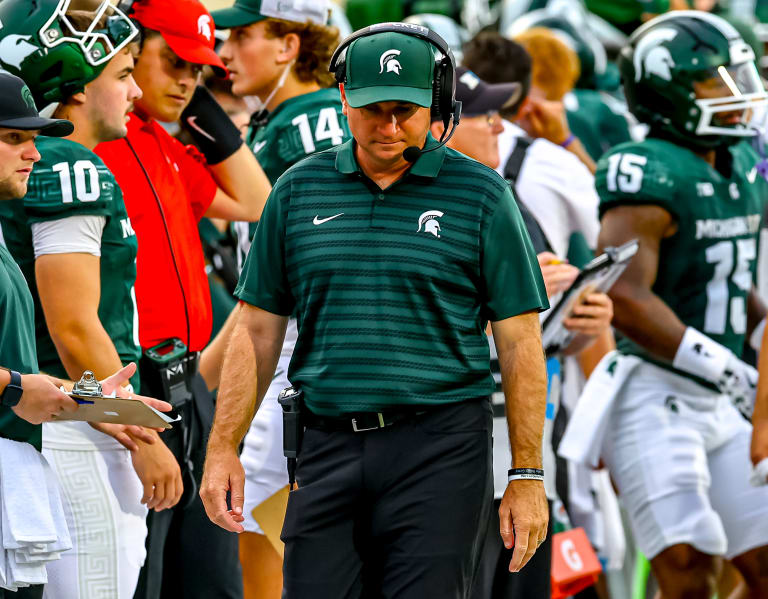The Michigan State Board of Trustrees on Friday gave the go ahead vote approving a study for a new project on the the west side of campus at the northeast corner of Harrison Road and Trowbridge Road, south of the new MSU Student Recreation and Wellness Center that is currently under construction.
The main project of the redevelopment study will be a new 4,000 seat arena for the Athletics Department that would allow hosting regional competitions in Olympic sports and is being required by the expanded Big Ten Conference in order to meet league requirements to host home events and conference competitions, university officials said.
“This multi-purpose development, which will be a public-private partnership, is a bold step toward fulfilling our mission as a passionately public university,” MSU President Kevin Guskiewicz said during Friday's board meeting.
Additional components of the project would include a new hotel, retail, housing, parking, teaching, research, and clinical facilities.
With the expansion of the league to include Oregon, UCLA, USC, and Washington, most teams currently possess facilities on campus to host regional events in Olympic sports, but MSU currently lacks any. This would result in an inability to hose home competitions regularly in East Lansing, an obvious cometptitive disadvantage for the Spartans.
A new potential arena, first mentioned for volleyball following the hiring of Leah Johnson in 2022 as a promise to address several shortcomings the program faced using Jenison Fieldhouse as its home, would be the focal point of the project, though. It is targeted at 4,000, smaller by roughly 900 compared to Jenison's volleyball capacity, and would be smaller than 10 of the league's arenas used for the sport (Purdue's Belin Court at Holloway Gymnasium has a published capacity of 4,090). Since Johnson's hiring, the volleyball program has played its home games at the Breslin Center, breaking program attendance records both seasons with 8,789 fans in attendance against Nebraska on Oct. 6, 2023 besting the previous mark of 7,326 set against Michigan on Oct. 14, 2022.
Besides serving as a new home for volleyball, wrestling and gymnastics would also relocate from Jenison to use the facility in addition to new locker rooms and coaching office space. University classrooms would likely be included in the facility as well.
MSU would rely on donors and and future event revenue for the arena while other portions of the project would be likely tapped as a public/private partnership (P3).
“When I arrived in March and began these discussions, I knew we were standing at the threshold of something extraordinary,” Guskiewicz said. “This public-private partnership project isn’t just about new buildings; it’s about creating a vibrant ecosystem that amplifies MSU’s mission. From state-of-the-art research spaces to a modern arena and contemporary accommodations, we are crafting an environment that nurtures personal growth, encourages healthy competition and propels academic excellence. This development will be a testament to MSU’s dedication to our students, faculty, staff, alumni and the broader Lansing community.”
“A hallmark of a great institution like Michigan State University is being able to provide world-class facilities for students and student-athletes that enrich their collegiate experience,” said MSU Board Chair Dan Kelly. “Furthermore, the prospect of this facility using a public-private partnership model speaks to both MSU’s outreach and community engagement efforts and the institution’s role in economic development in the greater Lansing region.”
With the trustees’ unanimous approval of planning for the project, MSU is now able to being the formal bidding process from potential developers of the P3.
Bob Trezise, president and CEO of the Lansing Economic Area Partnership also stated that the project has the potential to enhance the Lansing region’s ability to attract events, improve tourism and complement other regional facilities and events.
University Trustees on Friday also approved construction of a 200,000-square-foot Plant and Environmental Sciences Building. Construction is slated to begin this fall and MSU expects it to be completed by December 2026. The facility will provide laboratory space for around 40 principal investigators in food security and climate adaptation along with their respective teams.
“State-of-the-art spaces will accelerate climate-critical discoveries while helping MSU attract talented graduate students and retain leading researchers,” Thomas Jeitschko, MSU interim provost and executive vice president for academic affairs, said in a news release.
10 of Michigan State’s 11 members of the National Academy of Sciences focus on plant and environmental sciences, the university said.
The state-of-the-art building will foster interdisciplinary collaborations between MSU’s College of Natural Science and College of Agriculture and Natural Resources, positioning the university “to make groundbreaking advances with a far-reaching impact on research, education and the broader scientific community,” Eric Hegg, dean of the College of Natural Science, said in the release.
Research teams from both the MSU-DOE Plant Research Laboratory and the Plant Resilience Institute will use the new building, aligning Plant Research Lab’s strengths in plant biology and molecular genetics with Plant Resilience Institute’s focus on developing crop varieties that can withstand heightened environmental stress.

